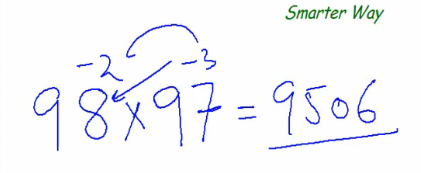Daily Practices for Optimal Cognitive Performance
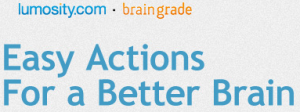 Lumosity, a well respected maker of brain training tools and games, recently shared the results of a massive (750,000 person) survey. They looked for specific daily practices that support optimal cognitive performance.
Lumosity, a well respected maker of brain training tools and games, recently shared the results of a massive (750,000 person) survey. They looked for specific daily practices that support optimal cognitive performance.
Here is what they found:
- 7 hours of sleep is much better than 5 or 10 especially when combined with the other practices.
- Exercise is key but your don’t need much. Cognitive performance peaks at about 2-3 workouts per week.
- Read at least 10 minutes everyday.
- Have 1-2 alcoholic drinks per day. Definitely avoid 3 or more.
- Play a musical instrument at least once per week.
Following these practices should improve memory and speed of mental processing.
Rarely do you see such specific advice on duration and quantity. Lumosity is able to get so specific when others are not because they have some 20 million registered users.
I am interested to hear from readers that decide to try this out.
Categories: Cognitive Decline, Diet, Lifestyle, Memory and Learning, Mental Focus, Music and Audio Tags:
Can Singing Significantly Improve Brain Function?
 The answer is yes according to the makers of SingFit an App for the iPhone and iPad that is due out in just a couple of weeks. Grounded in well-established principles from music therapy they claim:
The answer is yes according to the makers of SingFit an App for the iPhone and iPad that is due out in just a couple of weeks. Grounded in well-established principles from music therapy they claim:
“Scientific studies have shown that singing in general positively impacts the levels of hormones responsible for regulating mood, blood pressure and social bonding, including serotonin, cortisol and oxytocin. Furthermore, singing has been proven to help increase immune system strength and respiratory function while decreasing stress, pain and agitation. Imaging studies also reveal that singing can promote cross hemisphere brain activity, which can increase mental neuroplasticity and improve cognitive functioning.”
The app is free but they hope to sell you a $13 a month subscription for more content. I’d like to hear from readers that use this app or other forms of music therapy to build brain function and improve cognitive performance.
Categories: Ancient Ways, Memory and Learning, Music and Audio, Problem Solving, Sleep Tags:
Brain Training With Riddles – Does it Work?
 Working riddles makes you to think. Often you have to think hard or in new ways. Riddles are good at teaching us how to reframe a context, probe deeply on small clues, invert our assumptions and other problem solving heuristics. Some claim they are a great brain training tool. For example, I recently came across Riddles Improve Brain Functionality, Translate to Real-Life Problem Solving Skills, that claims:
Working riddles makes you to think. Often you have to think hard or in new ways. Riddles are good at teaching us how to reframe a context, probe deeply on small clues, invert our assumptions and other problem solving heuristics. Some claim they are a great brain training tool. For example, I recently came across Riddles Improve Brain Functionality, Translate to Real-Life Problem Solving Skills, that claims:
“A daily dose of riddles and brain teasers is one of the most effective ways to exercise the mind. It is proven that by spending just a few minutes a day “playing” improves memory, concentration and reaction time. This improved brain power translates into being more efficient as a parent, student, employee or boss.”
While I have yet to find a scientific study that supports the claim that working riddles significantly improves cognitive performance on everyday tasks, it does seem reasonable.
Try some out. Riddlesly (source of the quote above) is a popular site. Or for $15 you can get visual brainstorms from Marbles the brain store. Visual brainstorms is a deck of 100 cards with riddles of various types of levels.
Interested to hear from readers that use riddles as part of their Next brain training program.
Categories: Memory and Learning, Problem Solving Tags:
Simple Rules Immediately Boost Math Brain
 Learning or relearning the basics of arithmetic – or how to add, subtract, multiply and divide numbers – is painful for most. With calculators everywhere some ask why even learn arithmetic?
Learning or relearning the basics of arithmetic – or how to add, subtract, multiply and divide numbers – is painful for most. With calculators everywhere some ask why even learn arithmetic?
Arithmetic is a core skill in a broader competency called numeracy or how we think quantitatively or with numbers. Quantitative literacy is important for success in a wide variety of careers and household projects, even if you use a calculator! Turns out that learning arithmetic (when done right) is excellent brain training and a foundation for quantitative literacy.
One key – see patterns in numbers using simple rules.
For example, can you complete 98 x 97 = ? in five seconds without a calculator? How about without paper and pencil?
This YouTube video will teach you how to do the problem and similar ones in just a few minutes. A snapshot is given below.
This is just one example of how a simple rule will immediately boost you math skills and build your brain. Of course you need to practice to get it to stick. There are many such rules and even some math programs for sale that teach them. The video above comes from Glad2Teach that also offers a similar approach to algebra. Another program that combines simple rules with memory building and fun is Brainetics.
Even if you already know arithmetic, such programs offer 10-15 minute daily exercises for training your math brain and building quantitative competency.
Very interested to hear from readers with experience using programs that teach simple rules for doing complex arithmetic problems by looking for patterns in numbers.
Categories: Child, Cognitive Development, Memory and Learning, Mental Focus, Training Tags:
Playing Scrabble Can Boost Visual Cognition 20%!
 Competitive scrabble players are able to recognize words 20% faster than non scrabble players according to new research from the University of Calgary. More importantly, they found it enhances the cognition you use to recognize words:
Competitive scrabble players are able to recognize words 20% faster than non scrabble players according to new research from the University of Calgary. More importantly, they found it enhances the cognition you use to recognize words:
“The average literate adult relies on three components to process and read a word: sound, spelling and meaning,” says Penny Pexman, professor of Psychology. “When we studied the Scrabble players, we found that there is significant flexibility in the tools they use to read words and that it can include the orientation of the word as well.”
Playing games is one well-known strategy for improving brain function and cognitive performance. Many posts on the Next Brain Blog cover the topic. Trouble is skills developed by game playing are often margin improvements and don’t transfer into new domains. That makes the finding about play Scrabble significant – 20% improvement and it transfers!
I am interested to hear from readers that are getting significant and transferable brain boosts from other games.
Categories: Lifestyle, Memory and Learning, Perception Tags: games
Use Your Finger to Crank Your Brain
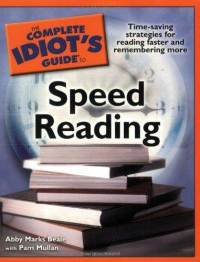 I read faster from paper than I do on a computer screen. With paper I can use my finger to guide my eyes. A well-known speed reading technique, guiding and pacing, lowers the load on your visual system and helps avoid skipping back and other distractions. It is simple and it works. Try it out.
I read faster from paper than I do on a computer screen. With paper I can use my finger to guide my eyes. A well-known speed reading technique, guiding and pacing, lowers the load on your visual system and helps avoid skipping back and other distractions. It is simple and it works. Try it out.
With practice you can drop your finger and still get the effect because your eyes have been retrained. I get some of this effect but am still fastest with good comprehension when I use my finger.
This is just one of the techniques covered in the excellent book, The Complete Idiot’s Guide to Speed Reading.
If you don’t already use these techniques, several weeks of practice will produce a big jump in you reading speed and will likely improve comprehension as well.
Reading speed is important. The difference between a slow reader and an excellent reader means 3 books per week if you read an hour a day.
Very interested to hear from readers that have simple techniques (e.g. use of your finger) to crank your reading speed or other cognitive performances.
Categories: Books, Memory and Learning, Mental Focus, Perception, Training Tags: processing speed, speed reading
Hard Evidence that Meditation Changes our Brains
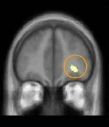 Mediation and mindfulness training is a frequent topic on the Next Brain Blog. Over the last several years we have seen studies that show a few weeks of meditation can produce measurable improvement in cognitive function and long-term practice actually makes certain brain regions larger. Now researchers at UCLA report in, Is Meditation the Push-Up for The Brain?:
Mediation and mindfulness training is a frequent topic on the Next Brain Blog. Over the last several years we have seen studies that show a few weeks of meditation can produce measurable improvement in cognitive function and long-term practice actually makes certain brain regions larger. Now researchers at UCLA report in, Is Meditation the Push-Up for The Brain?:
“… that people who meditate also have stronger connections between brain regions and show less age-related brain atrophy. Having stronger connections influences the ability to rapidly relay electrical signals in the brain. And significantly, these effects are evident throughout the entire brain, not just in specific areas.”
Changing the physical structure of the brain to preserve and enhance function and cognitive performance makes meditation a high-value training technique.
Interested to hear from readers that use any form of meditation. What technique do you use? How long have your practice? What Next Brain benefits do you see?
Categories: Cognitive Decline, Memory and Learning, Older Adult, Training Tags: meditation, mindfulness
What is Your Brain Performance Index?
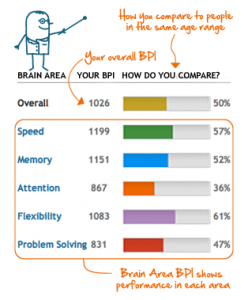 Lumosity, a leader in the growing field of cognitive training, has introduced the brain performance index. The index is an empirical and comparative measure of your ability to focus and sustain attention, processing speed, memory, problem solving skill and mental flexibility. You can set up an account and build your profile for free. If you want to know how you compare to others in your age group you need to subscribe.
Lumosity, a leader in the growing field of cognitive training, has introduced the brain performance index. The index is an empirical and comparative measure of your ability to focus and sustain attention, processing speed, memory, problem solving skill and mental flexibility. You can set up an account and build your profile for free. If you want to know how you compare to others in your age group you need to subscribe.
Like other instruments that assess your cognitive abilities, the brain performance index (BPI) gives insights into strengths and weaknesses. It should help you define goals for working on your next brain.
Interested to hear from readers that use the BPI or other assessment instruments to set goals for how best to achieve peak cognitive performance.
Categories: Memory and Learning, Mental Focus, Problem Solving, Software Tags: brain fitness
Expand Working Memory – Your Brain’s Bandwidth
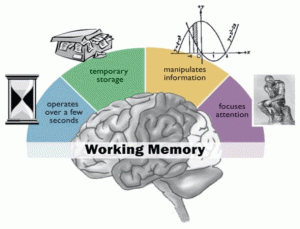 Working memory holds the contents of what we are paying attention to at any one time. It is a small active memory store that provides the information we process when thinking, making decisions, solving problems and performing other cognitive tasks. Working memory is like your conscious brain’s bandwidth, it is a measure of the amount of information that can be processed at any one time. The more bandwidth the higher your cognitive performance.
Working memory holds the contents of what we are paying attention to at any one time. It is a small active memory store that provides the information we process when thinking, making decisions, solving problems and performing other cognitive tasks. Working memory is like your conscious brain’s bandwidth, it is a measure of the amount of information that can be processed at any one time. The more bandwidth the higher your cognitive performance.
Research has shown that simple training tasks can expand our working memory and increase fluid intelligence or our reasoning and problem solving capabilities.
The training, called the n-back technique, presents you with a series of sounds or pictures. In the case where n = 2 you want to identify the sound or image that is just like the second one in the series. Once you master that you move up to n = 3 and identify the sound or image that is just like the third one in the series. As the value of n increases you must hold more and more information in your working memory. This exercises it like a muscle.
Doing n-back training for 20 minutes a day for 20 days produces a measurable improvement in reasoning and problem solving power. And it seems the level of improvement you get increases with the amount of training you do. According to research presented at the May 28th American Association for Psychological Science Meeting:
“These new studies demonstrate that the more training people have on the dual n-back task, the greater the improvement in fluid intelligence,” Jonides said.
They also found the effect works for children as well as adults and that single n-back training (focusing on the images OR the sounds) works as well as dual n-back training (focusing on the images AND the sounds).
N-back training is a perfect technique for a iPhone or mobile app. Unfortunately, I cannot find one. To get the technique a try, go to this free web-based application. To dig a bit more you might want to try The Brain Workshop but you have to download software to your computer.
Interested to hear from readers that do n-back training. What value of n have you reached? How has this type of training impacted your cognitive performance in everyday or professional tasks?
Source for Image: Working Memory
Categories: IQ and EQ, Memory and Learning Tags:
Music Lessons Offer Lifelong Cognitive Benefits
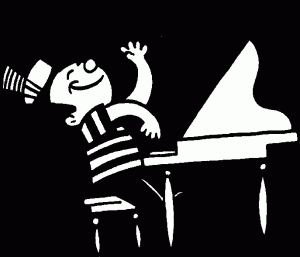 Music is great for the brain in many ways. Learning to play a musical instrument is an excellent investment in improving brain function and cognitive performance. An interesting new study suggests that the brain boost we get from music lessons may last a lifetime. The study reported by the American Psychological Association examined the cognitive performance of adults (ages 60 t0 83) that studied music in childhood.
Music is great for the brain in many ways. Learning to play a musical instrument is an excellent investment in improving brain function and cognitive performance. An interesting new study suggests that the brain boost we get from music lessons may last a lifetime. The study reported by the American Psychological Association examined the cognitive performance of adults (ages 60 t0 83) that studied music in childhood.
“The high-level musicians who had studied the longest performed the best on the cognitive tests, followed by the low-level musicians and non-musicians, revealing a trend relating to years of musical practice. The high-level musicians had statistically significant higher scores than the non-musicians on cognitive tests relating to visuospatial memory, naming objects and cognitive flexibility, or the brain’s ability to adapt to new information.”
While these findings are tentative and require additional research, they do signal that musical training is a powerful tool for building your Next Brain.
Interested to hear from readers that were trained musically as children. How has that shaped your cognitive skills as an adult?
Categories: Child, IQ and EQ, Memory and Learning, Music and Audio, Older Adult, Perception, Problem Solving, Training Tags:


